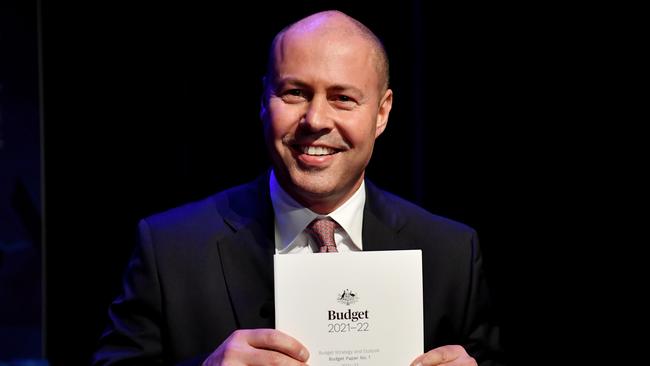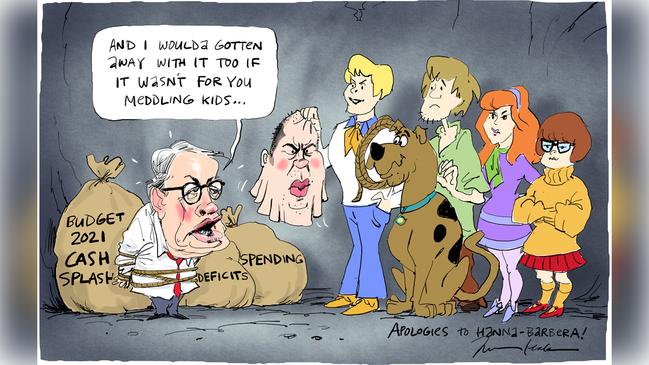Budget 2021: Josh Frydenberg’s spending spree may come back to haunt him

Attached to that award would be several less flattering subtitles: the first treasurer in 100 years to preside over a pandemic with the highest debt and deficit ever created; the biggest spending treasurer in Australian history ushering in the new roaring 20s; the first Liberal treasurer to deliver Labor’s budget with barely a hint of a blush or an apology.
Thanks to COVID-19, political necessity has been richly complemented by economic imperatives.
The pandemic has provided the perfect excuse for a liberating, redefining philosophy that more is more, and a saleable rationale to cover every base, tick every box, push every button, fund every problematic cohort, all age groups — working or retired — all genders, build roads or roundabouts (eventually) in the seats that need them most and chop Labor off at the knees.
It is highly doubtful they have been, but if any individual or any group feels overlooked there is a lazy $9bn labelled “decisions taken but not yet announced” salted away.
The blockbuster budget comes with everything except the election date, although any time after August has gained traction providing the budget does its job and puts the government back in front in the polls and another government MP — George Christensen or Andrew Laming — heads to the crossbench to give Scott Morrison the excuse of minority government to go super early.
The Prime Minister always could nudge along potential defectors by announcing in parliament he had instructed they stand aside, and if they didn’t wish to do so they could go. That worked with former Australia Post chief executive Christine Holgate.
Or Labor could oblige by blocking a key measure, which would enable Morrison to use it as a pretext for a double dissolution later in the year, although it is difficult to see anything in this budget the opposition would be inclined to oppose. Despite Anthony Albanese’s boast Labor is ready for an election whenever it is held, later, as far away from this budget as possible, would suit him better.
Conditions may not be as benign for the government next year, especially if there is any lessening of anxiety around COVID-19. Returning to normal carries with it the threat of the return of politics as usual. The eruption of anger from women over his inadequate responses to their safety and security concerns shows how vulnerable Morrison can be when debate strays from the pandemic.
Every state and territory election in the past year has shown the huge benefits COVID delivers to incumbents. If any further proof was needed of the potency of the fear factor surrounding COVID and why politicians continue to feed it and rely on it, it came in the reaction to Morrison’s threat to jail Australians if they returned from India. A cynical calculation, springing from his failures on quarantine and vaccination, appears to have won majority support.
It was politics at its worst deployed against a soft target that played into fear and self-interest. Expect more of that in the weeks and months ahead.
So in another happy convergence, for political as well as health and economic reasons — the cost of lockdowns from breakouts — international borders will remain closed until after the election, no matter when it is held, no matter if everyone who wants to be vaccinated can be jabbed by the end of the year.
And that also raises the question of what the government can do to get the rest to agree as vaccine hesitancy grows. That will also be easier addressed after the election rather than before.
When the ABC’s Michael Rowland asked the Prime Minister on Wednesday morning if he would keep his pledge to go full term, Morrison carefully dodged it, saying he would leave the politics to others. As if. When Karl Stefanovic asked him on Nine, he said it would be next year. Yeah right.
It’s best to ignore everything prime ministers say about election timing. Bob Hawke held a press conference, admittedly on April Fool’s Day, to rule out an early election, then he called one.
Nobody, not even those sitting behind him, believes Morrison will go the distance if he thinks he can win now. The numbers, the ones quietly being counted in marginal seats as we speak, will decide.
Having successfully junked decades of Liberal orthodoxy — which had eliminating debt and deficit and demonising Labor for creating it at the core of its claim of superior economic management — Morrison and Frydenberg have to keep voters focused on the recovery rather than on the days of reckoning.

A trillion-dollar debt has been cast euphemistically as a recalibration. The days when people would spontaneously applaud Peter Costello on his post-budget roadshow after he clicked on the graphs showing a surplus and how he had eliminated Labor’s debt are long gone.
We all have to learn to love debt because it will be with us for generations and because there is so little not to love in this budget. But one day Australians will demand to know who will pay for it all, when and how. Again, that won’t be until after the election. Then there will have to be another recalibration.
One way or another it will be Frydenberg’s problem. As his rival,opposition Treasury spokesman Jim Chalmers, says, there are only three ways to tackle debt as big as Everest: growth, less spending or increased taxes. The last two breed grumpy voters.
Another subtitle that has to be added to the list for Frydenberg, which always puts a spring in his step, is that he is now indisputably leader in waiting.
He has worked hard for it. Maybe Frydenberg will get lucky and make it into the top job while the Coalition is still in power. Stranger things have happened. But not often. Prime ministers have a habit of convincing themselves they are indispensable, that their party’s fortunes are completely dependent on them, no matter what public or private assurances they have given to likely successors.
A sunnier personality than his boss, Frydenberg is as well-known for his ambition as he is for his desire to get along with everyone. All being well, he is in it for the long haul — so, as Treasurer, prime minister or opposition leader, he will have to gird himself for even tougher times and even tougher decisions. Nothing is easier for governments than spending truckloads of taxpayers’ money.



Josh Frydenberg has to be a contender to win the gong as world’s greatest treasurer, now awarded by British magazine The Banker, thanks to his steerage of the Australian economy through perilous times by ensuring the recession was not as deep as originally feared, nor unemployment as high as forecast.